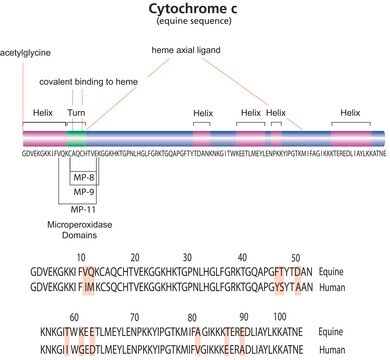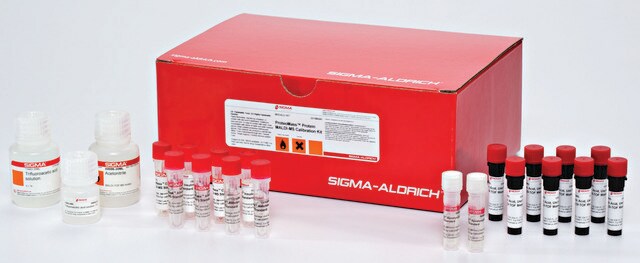UPS1
Universal Proteomics Standard Set
Protein Mass Spectrometry Calibration Standard
About This Item
Productos recomendados
form
ready-to-use solution
Quality Level
quality
Protein Mass Spectrometry Calibration Standard
technique(s)
mass spectrometry (MS): suitable
storage temp.
−20°C
Categorías relacionadas
General description
Application
- Bracketing critical experimental datasets for confirming the robustness of analysis methods
- Comparison of MS or other proteomic data that are generated in different labs using a variety of analytical strategies and instruments
- Identifying limitations of proteomics analysis systems and search algorithms
- An external reference to assist with the evaluation of data derived from poorly defined samples
Features and Benefits
- Test the power of your analytical strategy
- Troubleshoot and optimize your analytical protocol
- Confirm system suitability before analyzing critical samples
- Normalize analytical results day to day or lab to lab
Los componentes del kit también están disponibles por separado
- T6567Trypsin from porcine pancreas, Proteomics Grade, BioReagent, Dimethylated 20 μgSDS
related product
signalword
Danger
Hazard Classifications
Eye Irrit. 2 - Resp. Sens. 1 - Skin Irrit. 2 - STOT SE 3
target_organs
Respiratory system
Storage Class
10 - Combustible liquids
wgk_germany
WGK 3
Elija entre una de las versiones más recientes:
¿Ya tiene este producto?
Encuentre la documentación para los productos que ha comprado recientemente en la Biblioteca de documentos.
Los clientes también vieron
Artículos
The era of high-throughput proteomics has recently blossomed due in large part to advances in the methods by which proteins and proteomes are analyzed. Improved fractionation techniques, combined with advances in mass spectrometry, have decreased concerns of sample complexity, and directed more focus towards high-throughput techniques.
Contenido relacionado
Standardize Your Research. We offer both the Universal Proteomics Standard and the Proteomics Dynamic range Standard as complex, well-defined, well characterized reference standards for mass spectrometry.
Nuestro equipo de científicos tiene experiencia en todas las áreas de investigación: Ciencias de la vida, Ciencia de los materiales, Síntesis química, Cromatografía, Analítica y muchas otras.
Póngase en contacto con el Servicio técnico









